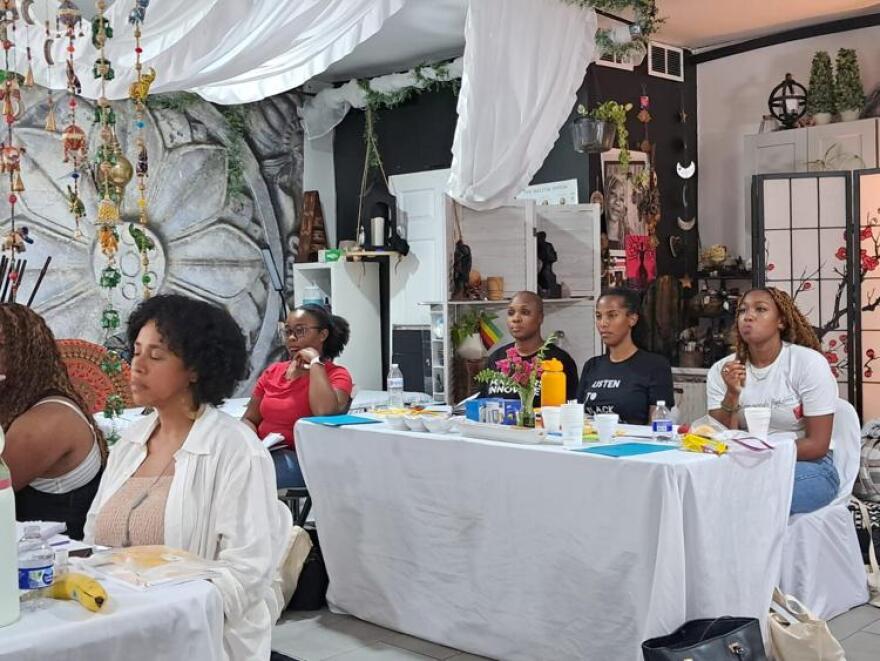In Florida, Black women experience disproportionately high rates of maternal and infant mortality — a fact two local Black-led nonprofits are working to change.
The Southern Birth Justice Network and Magnolia Birth House are collaborating to open a birthing and wellness center in the Miami area, providing what they see is a much-needed service for expectant mothers in the community.
“We’re hoping to close that gap,” said Jamarah Amani, head midwife of the Southern Birth Justice Network. “Having a stationary place where people know they can come, I think, is a really important point of growth.”
Despite community backing and financial help from The Miami Foundation, the group has yet to secure a property for the birthing center, however, nor has it reached its $2.5 million funding goal, citing a lack of available real estate and support from investors, donors and Miami-Dade County officials.
A birthing center offers an alternative to hospital deliveries, featuring a home-like environment that emphasizes natural childbirth and caters to low-risk pregnancies.
With Miami’s Jackson South Medical Center recently joining the expanding list of hospitals that have shuttered their maternity units in South Florida, Amani believes the center will help fill a widening hole in local maternal care.
As a wellness center, she also wants it to provide other types of care beyond birthing services, including mental health support, yoga classes, and acupuncture and chiropractic care.
“Even if it's a service we don't provide, we try to connect people to safe places where they can get what they need. So we hope to see that referral network becoming more robust and having more partnerships where we can really wrap ourselves around the community and not let people fall through the cracks,” Amani said.
Amani envisions the building as a hub for birth justice, a movement that advocates for safe and equitable maternity care, especially in marginalized communities.
About 80% of pregnancy-related deaths in the United States are preventable. She sees that statistic as an injustice.
“Not only will we provide direct services, but we also hope to build the workforce of birth workers and of advocates that are demanding better outcomes for our people,” said Amani.
The nonprofits have received $500,000 from The Miami Foundation through the Collective Real Estate Ownership (CREO) fund, a Wells Fargo-sponsored grant that helps small businesses, artists and nonprofits purchase commercial property in historically underserved communities. CREO also helped three community groups pool funds to open Roots Market & Bookstore in Liberty City last month.
The Southern Birth Justice Network and Magnolia Birth House have separately raised an additional $300,000.
Amani thought securing funding would be the hard part, but finding a property to call home has been the real challenge.
The group is looking for a location that is zoned for birthing centers, within a city that is willing to support the cause, and near an underserved community all at once.
They nearly secured a location in Miami Gardens last year, but were blocked in December after the building was deemed incompatible with the city’s Entertainment Overlay District.
“That was really devastating because we had already put up our earnest money. We were moving forward. And that was just like taking all the wind out of the balloon,” Amani said.''
READ MORE: A Lauderdale Lakes maternity center opened last May expecting 200 patients. It's up to 1,700
Brittany Morgan, Miami Foundation’s senior director for economic resilience, sees potential for financial loss as a key barrier preventing donors and investors from participating in nonprofit endeavors like what Southern Birth Justice Network and Magnolia Birth House are pursuing.
For real progress to be made, Morgan says lenders will need to think beyond profit incentives and see positive social outcomes as worthy of investment.
“A lot of banks and conventional lenders look at risk through just the financial lens. But what is the risk economically of having a lot of infant mortality and maternal health outcomes? Those are also costly to our society,” said Morgan.
Julia Wilkinson, cofounder of business consulting firm LEBEC, another partner in the CREO fund coalition, has seen many foundations invest their endowments very conservatively and sometimes in ways that quietly contradict their social missions.
With the effects of social and environmental issues like maternity mortality and climate change already being felt, Wilkinson believes it is time for these foundations to take more aggressive approaches to their investments and give causes like Amani’s a chance.
“On the one hand, you got people looking just at return, and on the other side they are looking only at impact, and they were not communicating,” said Wilkinson. “All foundations have that challenge, which is they're not necessarily all integrating the way they approach and think about impact on both sides of the balance sheet.”
Amani has had to educate nearly everyone she's spoken with about her mission, explaining everything from what a birthing center is to whether it’s a profitable venture for potential lenders and city officials.
Despite the difficulty, she hopes the birthing and wellness center will be a place for midwives to train and grow in numbers, helping integrate them into the broader healthcare system that may need their help now more than ever.
“This is the way that maternity care is going, especially because hospitals are closing and people still are giving birth. So for sure, people need to recognize that this is the future and get on board with where things are going,” Amani said.
This story was produced by The Miami Times, one of the oldest Black-owned newspapers in the country, as part of a content sharing partnership with the WLRN newsroom. Read more at miamitimesonline.com.





